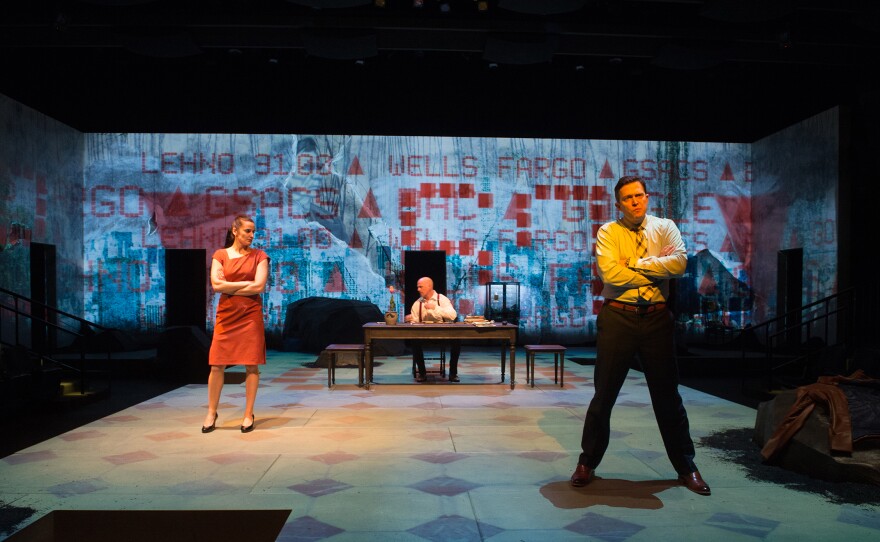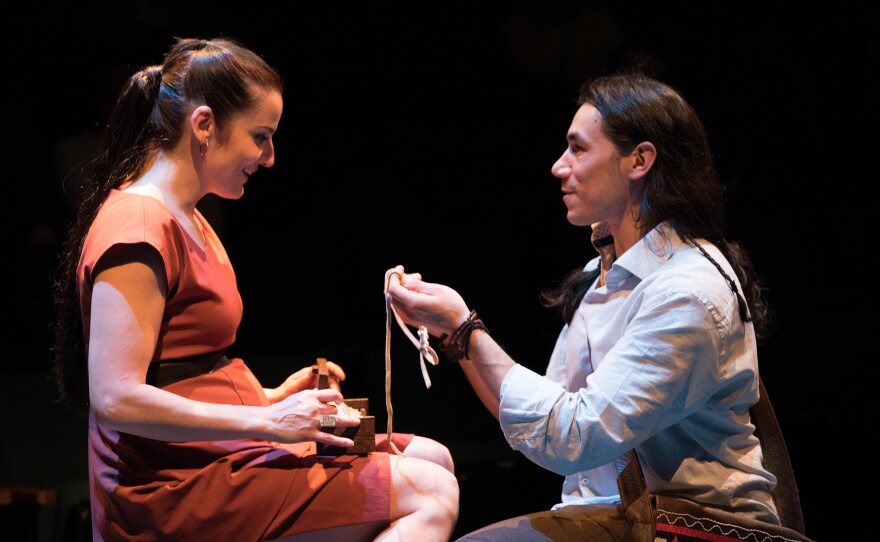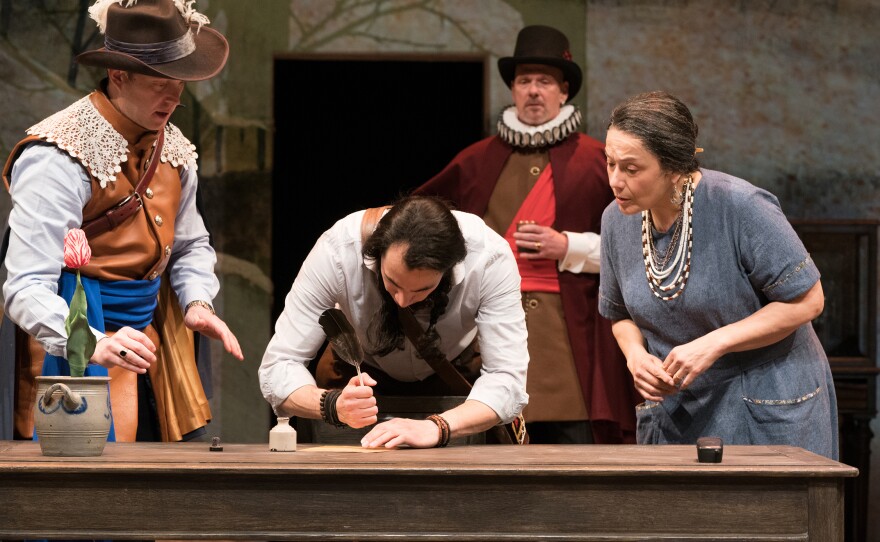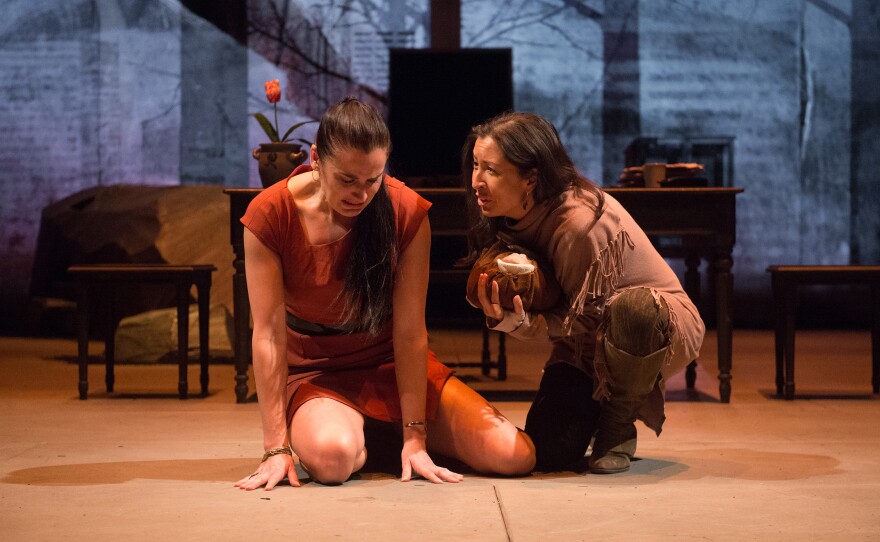In 1626, officials of the Dutch West India Company claimed to have bought Manhattan Island from a local tribe. Before long, they drove the Indians from their homes.
Nearly 400 years later, millions of Americans lost their homes when Wall Street banks bundled shaky loans into triple-A-rated securities.
The confluence of these events is the canvas on which playwright Mary Kathryn Nagel paints “Manahatta.” The play had its world premiere at the Oregon Shakespeare Festival on April 1.
For Mary Kathryn Nagle, one truth is central to understanding the many challenges facing society.
“The past is present and the present is the past, and you can’t separate the two,” she says. “I think a lot of people want to separate the past. And we carry it with us.”
That sense lies at the heart of Nagle’s new play, “Manahatta.” And her approach to weaving together events across the continent -- and across the centuries – makes for a powerful, and sometimes disorienting, experience.
“I am trying to get us out of a linear way of thinking and to see the connections, and what we’re continuing to repeat and what those cycles are, with the hope that the ones that are harmful perhaps we can take steps toward breaking them,” she says.
The play is set in two places: Manhatttan and Anadarko, Oklahoma, where many of the descendants of the Lenape tribe who inhabited the island they called “Manahatta” migrated centuries later. The play also is set in two times: the mid-1620s, when the Dutch were establishing lower Manhattan as the trading post New Amsterdam, and in the late 2000s, as the sub-prime mortgage bubble grew, then burst, leading to the Great Recession. In time, these realities bleed together, overlapping and echoing each other.
In this scene, Peter Minuit, governor of the Dutch West India Company, goes to the Lanape to try to buy Manahatta …
MINUIT: Do you own all of Manahatta? SE-KE-TU-MAY-QUA: “Own”? MINUIT: Does this land belong to you? LE-LE-WA’-YOU: We live here, yes. MINUIT: But, does Manahatta belong to you? LE-LE-WA’-YOU: Manahatta is the word our ancestors used to describe their home. MUNUIT: This place? SE-KE-TU-MAY-QUA: Our home. MINUIT: So, you own Manahatta! SE-KE-TU-MAY-QUA: If you say so … MINUIT: No! Not me! You just said it’s your home! SE-KE-TU-MAY-QUA: I don’t understand your word “own.” MINUIT: Look, let’s not overly complicate things …
Similar dynamics play out in another scene, where Bobbie -- an older Lenape woman in Anadarko -- is struggling to pay off a huge medical debt left over from her husband’s recent death. A local banker and part-time minister is selling her on a risky mortgage …
MICHAEL: Do you own this home? BOBBIE: I live here, yeah. MICHAEL: But do you own it? BOBBIE: This is my home. MICHAEL: Yeah, but is your name on the deed? BOBBIE: It’s on all the bills that come here. MICHAEL: Look, let’s not overly complicate things. In order to take out a loan on this house, we have to show the bank that you own it. BOBBIE: I live here, yes. MICHAEL: But do you own this house? BOBBIE: Grandpa got this land in the allotment. He built the whole house himself, didn’t get help from nobody. Grandpa and grandma moved in and six weeks later, Mom was born. I was born here and then I married Charlie and he moved in. We had Deborah and seven years later the Creator blessed us with Janie. So for as long as I can remember this has been our home.
Nagle has each actor play two roles, separated by place and time, but filling similar dramatic niches as these realities play out on parallel tracks. For example, the actor who plays Dick Fuld, the hard-charging head of the doomed Lehman Brothers investment bank, also plays Dutch governor Peter Minuit. The actor who plays Michael, the local Oklahoma banker and minister who sells Bobbie the high-risk loan, also plays Jonas Michaelius, a pastor sent by the Dutch West India Company to bring Christianity to the natives.
In this scene, Michaelius and Minuit set each other straight on their respective priorities …
MICHAELIUS: I’ve come to share the gospel. MINUIT: With the Indians? MICHAELIUS: The Company has asked me to. MINUIT: Well, I wish you the best in your endeavors, I truly do. But very few of them speak. And those that do have no grasp of basic concepts like capital, commerce, ownership. They have no idea how an economy actually works! MICHAELIUS: Understanding how an economy functions is one thing. I leave that to you. But hearing and receiving the Lord’s word, is for all his children, savage may they be!
Nearly four centuries later, the banker Michael uses similar language to reassure his doubtful son Luke that selling Bobbie that shaky mortgage is for the best …
MICHAEL: You wanna just sit back and watch her lose her home? LUKE: I wanna make sure she understands the loan, y’know before .. MICHAEL: She doesn’t. She never will. Folks like her, they have no grasp of basic concepts like capital, commerce, ownership. They have no idea how an economy actually works. And that’s why we have to help ‘em. Y’know … reach out and share the Gospel with ‘em.
Mary Karthryn Nagle says that echoing of language is meant to help modern audiences make a connection.
“What the banks on Wall Street did on 2008 when millions of Americans lost their homes, is a repeat of what institutions of power did on that same street, 400 years ago, when the Dutch took the entire island from the Lenape people,” she says.
Nagle believes making those connections can help us heal the pain of past injustices … and help avoid committing future ones.
Manahatta is playing through October 27th at the Oregon Shakespeare Festival in Ashland.







